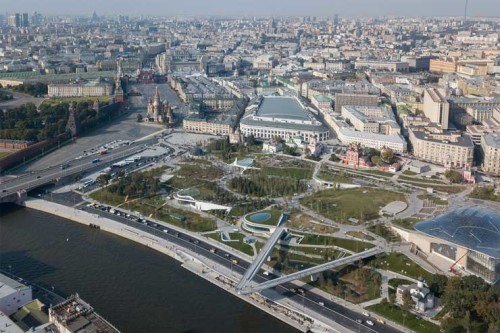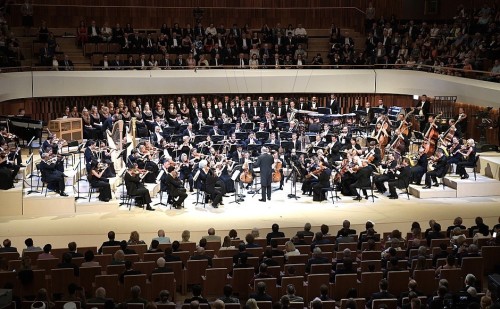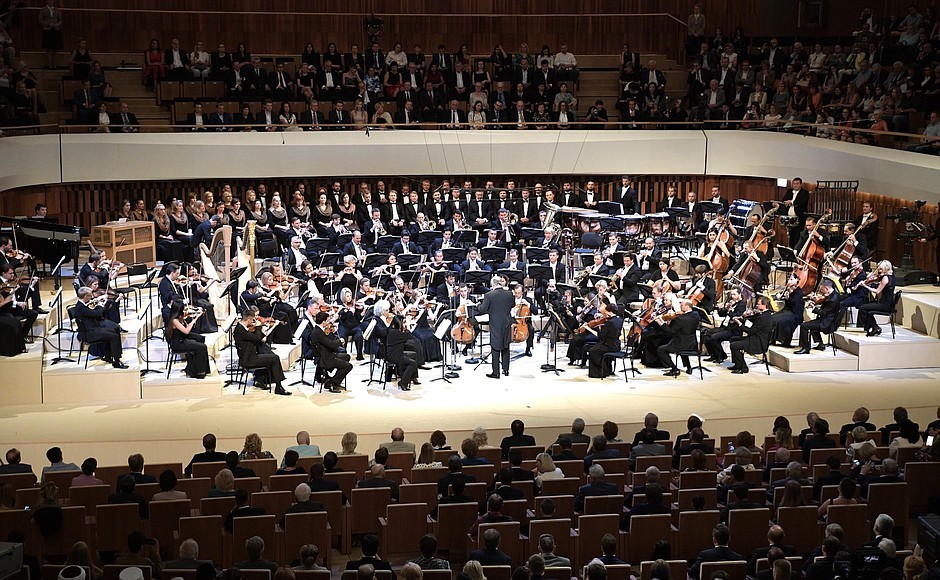 Russian Federation Mussorgsky, Shchedrin, Stravinsky, Shostakovich, Rachmaninov, Tchaikovsky: Albina Shagimuratova (soprano), Ildar Abdrazkov (bass), Mikhail Petrenko (bass), Denis Matsuev (piano), Daniil Trifonov (piano), Pinchas Zukerman (violin), Anna Netrebko (soprano) Mariinsky Chorus and Orchestra / Valery Gergiev (conductor), Zaryadye Concert Hall, Moscow, 8.9.2019. (GT)
Russian Federation Mussorgsky, Shchedrin, Stravinsky, Shostakovich, Rachmaninov, Tchaikovsky: Albina Shagimuratova (soprano), Ildar Abdrazkov (bass), Mikhail Petrenko (bass), Denis Matsuev (piano), Daniil Trifonov (piano), Pinchas Zukerman (violin), Anna Netrebko (soprano) Mariinsky Chorus and Orchestra / Valery Gergiev (conductor), Zaryadye Concert Hall, Moscow, 8.9.2019. (GT)

Mussorgsky – Prologue to Khovanschina
Shchedrin – Solemn Overture
Glinka – Ruslan and Lyudmila, aria ‘Wonderful dream of real love’
Mussorgsky – Prologue to Boris Godunov, ‘Greetings, Boris Fyodorovich’
Rachmaninov – Rhapsody on a Theme by Paganini, Op. 43
Mussorgsky – Khovanschina, arioso ‘Well done, children’
Tchaikovsky – Sérénade mélancolique in B flat minor
Shostakovich – Piano Concerto No.1
Glinka – The Tsar’s Bride, aria of Marfa
Mussorgsky – From Pictures from an Exhibition, ‘The Great Gate of Kiev’
The Zaryadye is the second concert hall to be built in Moscow in the last twenty years; its neighbour the Svetlanov Concert Hall (I have never been there) is situated down river just a kilometre or so away. This brand new state-of-the-art venue is one the site of an old hotel. Zaryadye was an area which was part of Moscow’s Chinatown in former times. Now within a 13 hectare park area on the Moscow river behind St Basil’s Cathedral and Red Square, it will prove an excellent option as a multi-purpose venue in the city centre. Designed by a Russian architect’s firm, it is ultra-modern outside dominated by steel and glass, and modelled on the Expo building for the 1967 Soviet exhibition. Inside, the hall is dominated by a space age design throughout with a beige and golden pine colour scheme. The hall was designed by the Moscow-based ‘Reserve’ design architect firm led by Sergei Kuznetsov, Moscow chief architect. Spacious foyers offer a view over the Moscow river, and of St Basil’s Cathedral and the Kremlin. Entering the hall, one is reminded a little of the Elbphilharmonie in Hamburg and Philharmonie de Paris, but the texture of the walls are of resonant wood materials presumably assisting the admirable acoustic of the auditorium. There are two auditoriums, one holding 1560 people, and a chamber hall for 400 people plus a recording studio. On my first hearing, there is a crystal clear acoustic, although one wonders if the musicians themselves can hear everything, for Gergiev had the orchestra at least four metres back from the stage with the orchestra and chorus firmly at the rear so as to project the sound better. The orchestra were on risers, and the stage area is more than ample, perhaps the greater space proving useful for ballet and opera. From where I was sitting, at the far back of the hall, it seemed to me as if the brass instruments were louder and drowned out the strings, but the chorus could be heard clearly. The audience are seated all around the hall with seats behind the performers.

Gergiev’s musicians are of course top class, but I wonder why they travelled through from St Petersburg when any of the best orchestras in the capital could have opened this new concert hall. Certainly, the Bolshoi Theatre Orchestra, State Symphony, or Fedoseyev’s Tchaikovsky Orchestra are of admirable musical standards or perhaps this was because there is the association of the Mariinsky with President Putin who performed the opening ceremony. There were many invited guests present, dignitaries and officials from the Orthodox church, and the appearance of soberly suited gentlemen along the aisles revealed that many important statesmen were in attendance. Surprisingly for such an occasion, there were quite a few empty seats, perhaps of diplomats who decided to stay away.
The programme was most interesting with two of Russia’s finest pianists on view; it was a curious opportunity to hear two quite different styles of Russian pianism.
The opening Prologue from Khovanschina was brilliantly heard particularly the flute, superbly backed by the strings, with wonderfully articulation from the woodwind and brass producing a stunningly glittering interpretation.
Rodion Shchedrin’s Solemn Overture seemed a little too grave for this occasion, yet as typical for this composer, full of bright invention and interesting orchestration, one wonders why so little of his music is not performed in the West. Each department of the Mariinsky Orchestra showed their talents amply in this first hearing for me, with percussion, wind and strings all having moments in which they could reveal their virtuosity.
An extract from Glinka’s Ruslan and Lyudmila sung by the coloratura soprano from Tashkent, Albina Shagimuratova, and was a highlight in this concert, again she is among the finest singers from Russia and who is rapidly building a formidable international career. Her tessitura was magical in the aria ‘A wonderful dream of real love’. One was reminded how rarely heard are the operas by Mikhail Glinka – the father of Russian music.
If the Uzbeki soprano proved magnificent in Glinka’s dazzling aria, one was a little disappointed by the Coronation scene from Boris Godunov, for the bass Ildar Abdrazkov seemed as if he was in a different world, he seemed so disengaged from the music, he was singing the notes, but there was little or no characterisation of this glorious music from Mussorgsky’s great opera. His lack of presence was assuaged by the colourfully spectacular playing of the orchestra and chorus.
In the Rachmaninov Rhapsody on a Theme by Paganini, Daniil Trifonov played it as if he was playing this work for the first time, and as if he was composing anew Rachmaninov’s variations, the notes were as if drops of fresh spring water flowing from a mountain stream transformed into glittering diamonds or pearls, this was a brilliant music-making experience, living music being created before ones’ eyes at least that is how it seemed. Such a contrast between this late romantic work and the jazzy modernism of Shostakovich’s brilliant Concerto for Piano and Trumpet with Denis Matsuev as the main protagonist. Matsuev is a formidable musician, he always produces a meaty, muscular performance at the keyboard and seems to bring out all the magic of the score, with quite astonishing technique, impeccably characterised. If Trifonov conjured up scenes of romantic nature, Matsuev played in a modern landscape of 20th century modernism with its dissonances, irony and sardonic harmonies. The outstanding trumpet player, unnamed in the programme, was adjacent to the conductor in front of the second violins, and it is a pity he was not mentioned for he gave a quite spectacular account of his important part, making this a vitally exciting piece, and always sounds best when both soloists are in tune with the jazz inflections of the score.
In the arioso from Mussorgsky’s Khovanschina ‘Well-done Children’ the bass-baritone Mikhail Petrenko was wholly in character with his role, displaying a wonderful colour and depth in his singing, showing exactly why he such a stalwart at the Mariinsky Opera.
Along with Shagimuratova, Anna Netrebko proved the star of all the singers, dressed in costume for the part, she gave a wonderful impression of Marfa’s aria from Rimsky-Korsakov’s The Tsar’s Bride, revealing a wonderful deep sensitivity and showing exactly why she is among the great singers in the world, not only in Russian opera but a soprano of Wagner and Verdi supreme.
Pinchas Zukerman was a surprize performer in the Sérénade mélancolique by Tchaikovsky and was actually the solitary dissatisfaction here; there was little colour in his phrasing and one wonders if he has not completely lost his ability to perform to a high level. I recall his disappointing performance in Edinburgh two years ago, and one wonders why he was engaged for this event. Certainly Gergiev gave him marvellous support, but this was inappropriate for surely a home-based violinist could have been fitted in.
This concert was brought to a glorious conclusion by ‘The Great Gate of Kiev’ from Mussorgsky’s Pictures from an Exhibition, itself an interesting choice considering Russia’s quarrels with the present administration in the Ukraine but showing the country’s deep ties with its Slavic neighbour.
Certainly, this gala concert was a finely performed occasion, and as such events go, much better performed and programmed than many others I have attended, and for such a voracious musical public as Russia’s capital boasts, many of the world’s top musicians are already booked up here in months to come so this Zaryadye concert hall is sure to prove popular.
Gregor Tassie
